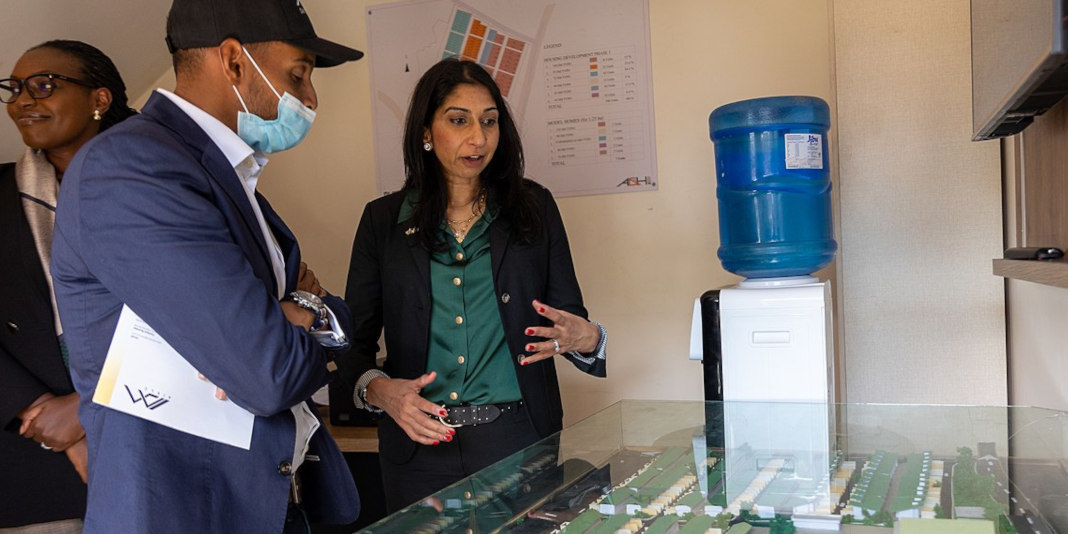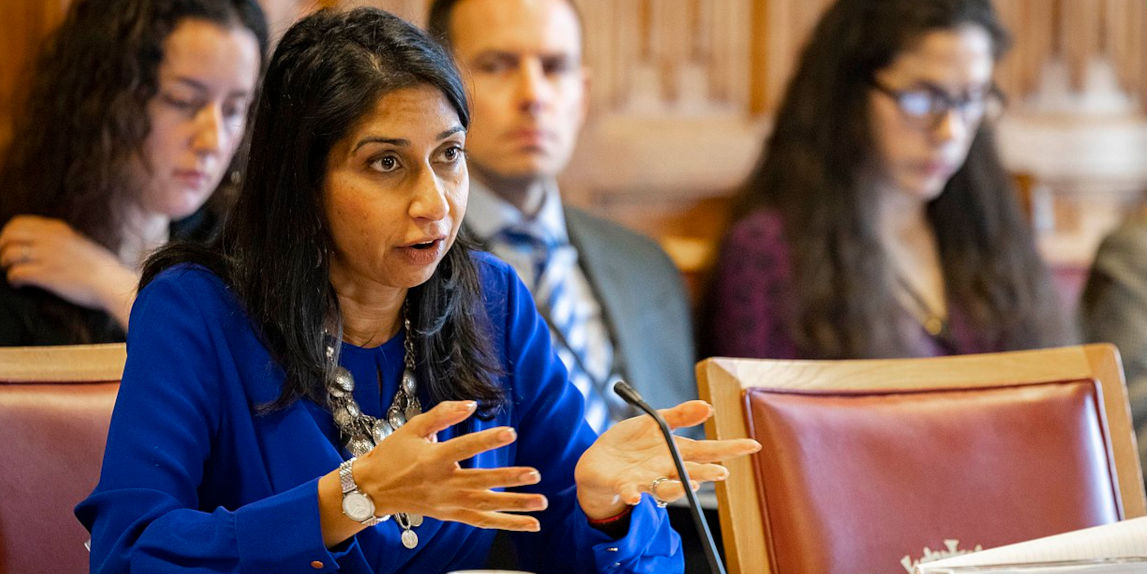On 4 February 2023 Rishi Sunak reportedly said he was prepared to take the country out of the European Convention of Human Rights (ECHR) as a way to improve the government’s legal position to ‘crackdown’ on those seeking refuge. One report said the proposed legislation would automatically ban those arriving ‘illegally’ in the UK from claiming asylum and would deny them their right to appeal against their automatic exclusion.
This development is hardly surprising. In 2022, Home Secretary Suella Braverman made her personal view clear that now the UK is out of the European Union it should also leave the ECHR. For Braverman, the ECHR is detrimental to an anti-migrant agenda as it legally challenged and prevented the first Rwanda asylum partnership deportation flight, described by the Human Rights Watch (HRW) as a ‘policy of cruelty’.
Braverman notoriously described seeing a deportation flight to Rwanda as her ‘dream’ and an ‘obsession’. This dream is nearly coming to fruition: a High Court ruling says flights could begin this year. This scheme was only made possible through the passing of the Nationalities and Borders Act 2022. The Act also sanctions pushing back small boats crossing the channel –a flagrant and dangerous violation of international law. As a result of anti-migrant legislation (as well as anti-protest bills), HRW says the UK is close to joining ‘countries listed as human rights abusers’.
Reality check
It is important to remember that the UK’s acceptance of asylum seekers is much smaller than other European countries – even if political rhetoric makes it feel otherwise. In the year ending September 2021 the UK received 72,027 applications for asylum. Germany received 127,730 while France received 96,510. Of course, the vast majority of refugees (85 per cent) settle in countries adjacent to that of their own so are found in low-income countries.
The Nationalities and Borders Act 2022 was justified around creating supposed safe and legal routes into the UK. But there are no legal routes – or very few – to apply for asylum, as a bumbling Braverman confessed during a recent select committee appearance. Braverman also claimed France is a safe country for those seeking asylum – in other words, they can stay there. But reports of abusive policies, including evictions, police harassment and restrictions on asylum seekers accessing basic essentials in France are rampant. With no legal routes to the UK and persecution from French authorities, Conservative policies are bolstering human trafficking. Many seeking asylum feel they have no choice but to engage in risky journeys across the channel.

Home Secretary Suella Braverman at the Bwiza Riverside Estate in Rwanda, 2023
Red is the new blue
Today most polls suggest a Labour Party victory at the next election. But a Labour government does not automatically mean the treatment of refugees and immigrants will improve. In 2022 Labour collectively voted against the Nationalities and Borders Act 2022, but this opposition was focused on technicalities rather than to call out the policy as unethical.
Labour’s new immigration plan, outlined in New Arrivals, lacks substantial policies. Instead it’s full of sweeping ideas that refugees and immigrants deserve rights but only if they can prove themselves as deserving and beneficial to society via ‘integration’, ‘shared values’ and ‘language requirements’ – terms usually associated with the far-right.
Starmer also appears obsessed with patriotic policy-making. In 2022 he said UK businesses should wean themselves off ‘immigration dependency’, leading to glowing praise from former UKIP leader Nigel Farage. Starmer also said Labour would consider the use of electronic tags on refugees and immigrants. Those hoping for an ethical and humanitarian approach to those seeking refuge after the next general election are likely to be disappointed.
Ways forward
So what do we do? For those of us concerned about creating better conditions, or even just complying with basic human rights, for those seeking asylum in the UK, what are the ways forward?
Today, the far-right is emboldened by anti-migrant discourse at the top and are orchestrating targeted campaigns against accommodation for asylum seekers. But recent polling shows that the UK is one of the most welcoming countries when it comes to accepting foreign workers, so there’s clearly a disconnect between the public and the political rhetoric of the Conservative and Labour parties.
In the UK, asylum seekers can only work from a restricted job list if they have been waiting twelve months for a decision on their case. This often means people have no option but to rely on paltry state benefits. The UK’s approach is much more restrictive than many other countries – European Union law requires member states to give access to all labour markets after nine months and in the US it’s after six months.
While mainstream politicians flap and fumble, it’s the grassroots that show us another world is possible
Many are doing important work to support those seeking refuge, including advocating for conditions that could improve their lives (such as the right to work), challenging UK legislation, showing up to counteract far-right protests, and engaging in crucial acts of rescue and aid. While mainstream politicians flap and fumble, it’s the grassroots that show us another world is possible.
After the far right’s violent protest outside a hotel housing people seeking asylum in Knowsley in Liverpool, it was local organisers, unions including the RMT, and activists who held an anti-racism rally in Liverpool. In response to another far right demonstration against a hotel housing refugees in Newquay, some 300 people turned up to protect the hotel and offer a counter protest, holding up signs such as ‘Refugees Welcome’ and ‘Fascists F*** Off.’
As people struggle to reach UK shores because of hostile policies, local residents and activists try to ensure people’s safety as they get out of the water. Channel Rescue acts as legal observers and monitors search and rescue operations, border force interceptions, and harassment from the far-right. Care4Calais provides aid, medical assistance, legal support and first aid to those in need in the UK and abroad. They’re also engaged in social cohesion, community building and advocacy — and they also legally challenged UK government immigration policy. Anti-Raids Network directly intervenes with police immigration raids, where possible, they also distribute information and legal support within communities where some are targeted by government policy and harassment by police.
Both the Conservative and Labour parties remain hopeless, uninspiring, and inhumane on migration. In January this year, two hundred asylum-seeking children who were placed in hotels run by the Home Office went missing. Since 2016 over 140 people have died in housing or hotels provided by the Home Office. Instead of calling to overhaul the current, deadly, approach toward migrants, we’re stuck with two similar parties, each trying to appeal to a fictive right-wing ‘average’ voter and in turn emboldening a more vocal actual far-right. It’s futile, then, to expect a progressive position on immigration from either of these parties. The only option is to look to the grassroots. It’s never been more urgent.










